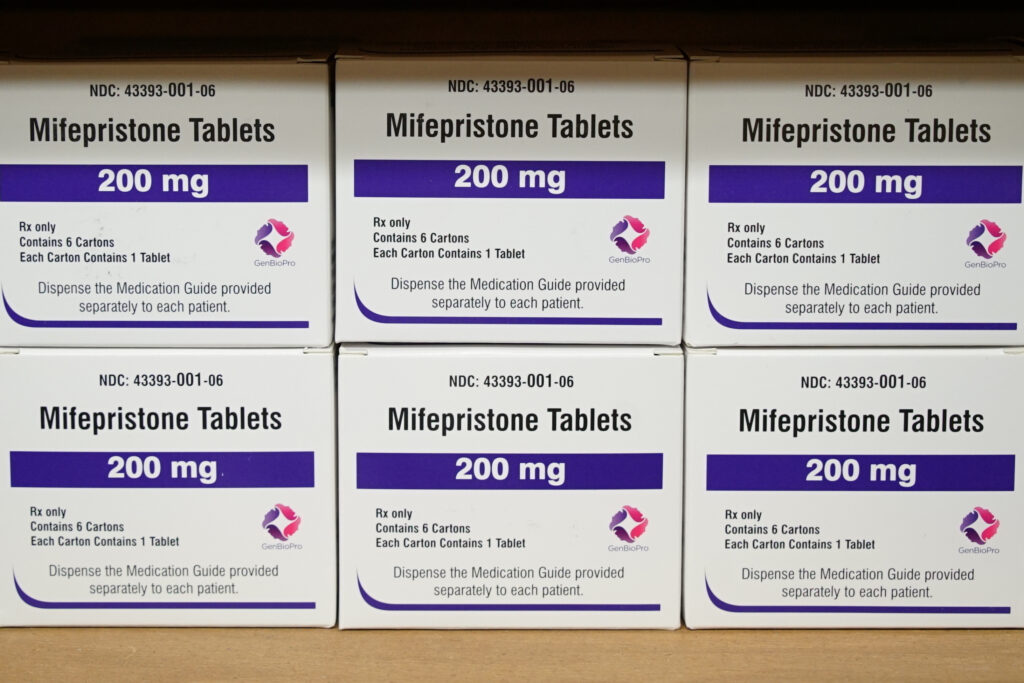
NEW ORLEANS (AP) — A three-judge panel of the 5th U.S. Circuit Court of Appeals heard arguments Wednesday (May 17) over whether the Food and Drug Administration approval of mifepristone should be revoked more than two decades after it was granted. The case is likely to wind up at the Supreme Court, which already intervened to keep the drug available while the legal fight winds through the courts. The high court’s decision came after a Texas-based judge revoked the drug’s approval.
Biden administration attorney Sarah Harrington opened by calling U.S. District Judge Matthew Kacsmaryk’s April 7 ruling an “unprecedented and unjustified attack on the FDA’s scientific expertise.”
“The Court does not second-guess FDA’s decision-making lightly but here, FDA acquiesced on its legitimate safety concerns – in violation of its statutory duty – based on plainly unsound reasoning and studies that did not support its conclusions,” Kacsmaryk said in his ruling.
Alliance Defending Freedom (ADF) argued the case urging the federal district judge to issue an injunction suspending or revoking Mifepristone.
There is no precedent for a U.S. court overturning the approval of a drug that the FDA has deemed safe and effective. While new drug safety issues often emerge after FDA approval, the agency is required to monitor medicines on the market, evaluate emerging issues and take action to protect U.S. patients.
Mifepristone, authorized by the FDA under President Clinton, causes the lining of the uterus to release the embryonic child, resulting in his or her death. Misoprostol, a drug approved by the FDA to treat ulcers, is typically taken one to two days later and causes the uterus to contract, expelling the body.
Medical/chemical procedures constitute a majority of all abortions in the United States. Medical/chemical abortions increased between 2001 and 2020 from 5 percent of all such procedures to 53 percent, the Guttmacher Institute reported in December.
Arguments Wednesday went on for two hours, with Harrington and Jessica Ellsworth, an attorney for Danco Laboratories, telling the panel that the doctors and groups who brought the lawsuit did not have a right to sue because they failed to prove they have been or would be harmed by the approval of mifepristone. Their claims that they would be forced to treat people who suffer complications from mifepristone — perhaps even completing abortions when the drug fails — are “speculative,” Harrington said.
“It just strikes me that what the FDA has done in making this more available … is you’ve made it much more likely that patients are going to go to emergency care or a medical clinic where one of these doctors is a member,” said Judge Cory Wilson.
Harrington disputed that, saying mifepristone is extremely safe, rarely results in complications, and that doctors could cite their conscience and refuse to participate in procedures.
But Erin Hawley, an attorney arguing for the anti-mifepristone plaintiffs, insisted that doctors opposed to abortion can be forced to violate their consciences if they are called upon to remove fetuses from the wombs of women who have had an incomplete medical abortion.
“They allege that they feel complicit in an elective abortion by being forced to complete that procedure,” she said in answer to questions from Judge Jennifer Walker Elrod.
The case comes to the appeals court almost a year after the Supreme Court overturned the Roe v. Wade ruling that had established abortion rights. Fourteen states have since banned abortion at all stages of pregnancy and other states have adopted, or are debating, major restrictions.
Ho twice referred to an “FDA can do no wrong” theme in the pro-mifepristone arguments.
“We are allowed to look at the FDA just like we’re allowed to look at any agency. That’s the role of the courts,” Ho told Ellsworth, who went on to say that the FDA has approved drugs later found to have safety problems.
The third judge hearing the case was Jennifer Walker Elrod.
Abortion opponents sued in November in federal court in Amarillo, Texas, where Kacsmaryk presides. An appellate panel voted 2-1 to narrow, but not completely block, Kacsmaryk’s ruling.
The panel’s April 13 decision said the abortion opponents appeared to be barred by time limits from challenging the initial 2000 approval. But the panel said adjustments made in later years — among them allowing the drug to be sent via mail and administered without a physician present — could still be revoked.
Wednesday’s hearing also dealt with the time limit issue, and whether the FDA’s later-year changes reset the clock and made full approval ripe for review.
“Is every time the FDA going to relax some prior restriction, requirement or safeguard based on a history of performance, does that mean we’re here on a reopening issue? I mean, how do you draw that line?” Wilson asked Hawley.
“Absolutely not, your honor,” she replied.
Other mifepristone rules that have changed since the drug’s initial approval include extending the time it can be used from seven to 10 weeks of pregnancy, and reducing the dosage needed to end a pregnancy.
From The Associated Press. May not be republished. AP reporters Jessica Gresko and Matthew Perrone contributed to this report from Washington.
















